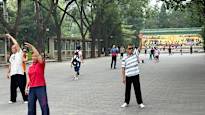Before this, China has not raised the retirement age for decades. The retirement age in China has been the lowest in the world.
China plans to raise the retirement age gradually starting in 2025.
The birth rate of a country teetering on the brink of a population crisis has fallen dramatically in recent decades, and its population is aging rapidly. China’s population decreased last year for the second year in a row.
The statutory retirement age for male employees will increase from 60 to 63 with the change, reports the state news agency Xinhua. The retirement age for women, on the other hand, will rise to 55 or 58, while previously it was 50 or 55, depending on the job.
According to the state media, the retirement age will be raised gradually over 15 years starting next year.
In addition, from 2030, in order to receive a pension, employees must pay a basic pension contribution for at least 20 years, while the current requirement is 15 years.
From the beginning of next year, it will also be possible for employees to postpone retirement if an agreement is reached with the employer, Xinhua says.
According to the estimate of the research institute Economist Intelligence Unit, by 2035, almost a third of the Chinese population will be over 60 years old.
Decision-makers and experts have warned of the potentially serious effects of population growth on the economy, health care and social security systems if no action is taken.
The retirement age was the lowest in the world
Before this, China has not raised the retirement age for decades, which has been one of the lowest in the world.
– The central government proposed changing the retirement age for the first time in 2013, and during the following decade there has been a lot of social discussion, says an economist to AFP Li Changan from the Beijing University of International Business and Economics (UIBE).
In the last few days, Friday’s announcement has also been supported by laudatory articles in the state media.
For example, in the state-owned Kansan däiellehti, the reform was linked to an increase in life expectancy and an increase in education. According to the article, the reform also increases the “efficiency of workforce development and utilization”.
However, independent population expert He Yafu assessed to AFP that the reform cannot substantially address the negative effects that the aging and shrinking population has on the economy, society and technology.
Starting in the 1980s, China had a strict one-child policy for a long time in order to limit population growth. It was abandoned in 2016, and in 2021 families were allowed a third child.
